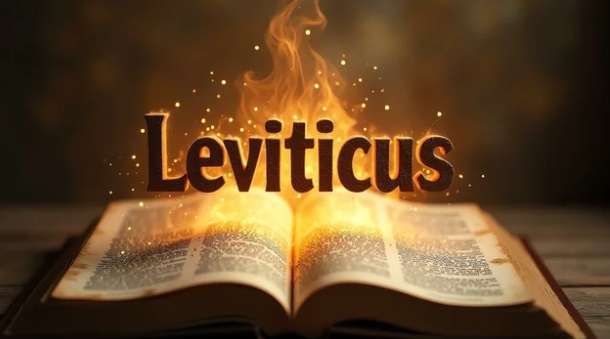50 Questions and Answers About the Book of Leviticus
1. What is the Book of Leviticus about?
Leviticus focuses on laws concerning worship, rituals, sacrifices, purity, holiness, and the priesthood, all designed to guide Israel in living a life set apart for God.
2. Who wrote Leviticus?
Traditionally, Moses is considered the author of Leviticus.
3. Where does Leviticus fall in the Bible?
It is the third book of the Old Testament and the Torah (Pentateuch).
4. What does the name “Leviticus” mean?
It means “pertaining to the Levites,” the priestly tribe of Israel.
5. Why is Leviticus important?
It provides instructions on how Israel was to live in holiness and how to maintain a relationship with God.
6. What is the central theme of Leviticus?
Holiness: “Be holy, for I am holy” (Leviticus 19:2).
7. What is the Day of Atonement?
An annual sacred day (Yom Kippur) where the high priest made atonement for the nation’s sins.
8. What are clean and unclean animals?
Animals classified in Leviticus 11 that Israelites could or couldn’t eat based on purity laws.
9. What is a burnt offering?
A sacrifice entirely consumed by fire as a symbol of total dedication to God.
10. What is a peace offering?
A voluntary offering expressing gratitude, often shared in a meal.
11. What is a sin offering?
A sacrifice for unintentional sins to restore fellowship with God.
12. What is a guilt offering?
A sacrifice made for specific sins requiring restitution.
13. Who were the priests in Leviticus?
Aaron and his sons were appointed as priests to serve in the tabernacle.
14. What was the role of the high priest?
To perform sacred duties, especially on the Day of Atonement, and intercede for the people.
15. What happened to Nadab and Abihu?
They were consumed by fire from God for offering unauthorized fire before Him.
16. What is the significance of the tabernacle?
It was the dwelling place of God’s presence among His people.
17. What is the Holiness Code?
Chapters 17–26 detailing ethical, sexual, and religious laws for holy living.
18. What does Leviticus say about loving your neighbor?
“Love your neighbor as yourself” is found in Leviticus 19:18.
19. Why were sacrifices necessary?
To atone for sin and maintain a relationship with God.
20. What is the significance of blood in Leviticus?
Life is in the blood, and it is the means of atonement (Leviticus 17:11).
21. What is a wave offering?
An offering presented before the Lord by waving it before the altar.
22. What is the purpose of the Sabbath?
A weekly day of rest and worship, dedicated to the Lord.
23. What are the appointed festivals in Leviticus?
Passover, Unleavened Bread, Firstfruits, Weeks, Trumpets, Atonement, and Tabernacles.
24. What is the Year of Jubilee?
Every 50th year, debts were forgiven, slaves freed, and land returned.
25. What is the Year of Rest (Sabbath Year)?
Every seventh year, the land was to rest from planting.
26. What does Leviticus say about cleanliness?
It outlines laws for physical and ritual cleanliness to approach God.
27. What are examples of bodily impurity?
Childbirth, skin diseases, bodily discharges, and mildew.
28. Why were these impurities important?
They symbolized the separation between sin and holiness.
29. What is the purpose of the laws on sexual conduct?
To promote moral purity and distinguish Israel from other nations.
30. What does Leviticus say about idols?
Idol worship is strictly forbidden; worship is to be directed only to God.
31. Why are offerings repeated so often?
Repetition emphasizes their importance and teaches consistency in worship.
32. What does Leviticus teach about justice?
It promotes fairness, protection of the poor, and ethical business practices.
33. What is a grain offering?
An offering of flour, oil, and incense expressing devotion and thankfulness.
34. Why is Leviticus 16 so important?
It details the Day of Atonement, the most sacred day in Israel’s calendar.
35. What does Leviticus teach about God?
God is holy, just, merciful, and desires a relationship with His people.
36. Is Leviticus still relevant for Christians today?
While ceremonial laws are fulfilled in Christ, its principles of holiness and ethics remain applicable.
37. How does Leviticus connect to the New Testament?
It foreshadows Jesus as the ultimate High Priest and sacrifice for sin.
38. What does Leviticus say about blasphemy?
Blasphemy is a serious offense punishable by death (Leviticus 24:16).
39. What does “unclean” mean in Leviticus?
Ritually impure or unfit to approach God, not necessarily sinful.
40. How were unclean people restored?
Through ritual washing, waiting periods, and sacrifices.
41. What does Leviticus say about tattoos?
It forbids body markings associated with pagan worship (Leviticus 19:28).
42. Why were dietary laws given?
To promote health and set Israel apart as a holy nation.
43. What’s the connection between holiness and daily life in Leviticus?
Holiness wasn’t just for worship—it affected eating, dressing, farming, and relationships.
44. Why did God give so many rules?
To teach His people how to live distinctly and honor His presence.
45. What does Leviticus say about the poor?
It commands care for the poor, including leaving harvest leftovers for them (Leviticus 19:10).
46. What is the punishment for disobedience in Leviticus?
Curses including disease, defeat, exile, and desolation (Leviticus 26).
47. What does Leviticus say about repentance?
God promises forgiveness and restoration to those who return to Him.
48. What does Leviticus 19:2 mean?
“Be holy because I, the Lord your God, am holy”—a call to reflect God’s character.
49. What does the scapegoat represent?
The removal of sin from the community, symbolically carried away by the goat.
50. How should we read Leviticus today?
With understanding of its historical context, appreciation for its spiritual principles, and awareness of its fulfillment in Christ.
